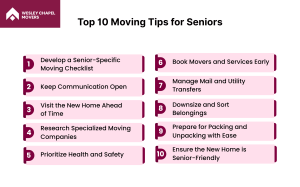The best time to move depends on several factors, including weather, cost, availability of moving services, and personal circumstances. Whether you are relocating for a job, family reasons, or a change of scenery, the timing of your move can greatly impact both the ease of the process and the associated costs.
While some prefer to move during milder weather to reduce physical strain, others may prioritize school schedules or lease cycles to minimize disruptions. However, the ideal time to move will depend on your specific needs. For example, summer offers longer daylight hours and school breaks, making it a convenient choice for families, but it also comes with higher demand and costs. On the other hand, winter can offer cost savings due to lower demand, though it brings challenges like harsh weather and shorter daylight. Additionally, moving companies are in higher demand during peak seasons like summer, meaning that planning in advance can provide more flexibility and lower prices.
By understanding how different seasons, weeks, days, and times of day impact your move, you can choose a timing that best fits your priorities. This guide will explore the optimal times to move based on these factors, helping you plan your relocation more efficiently.
By Season
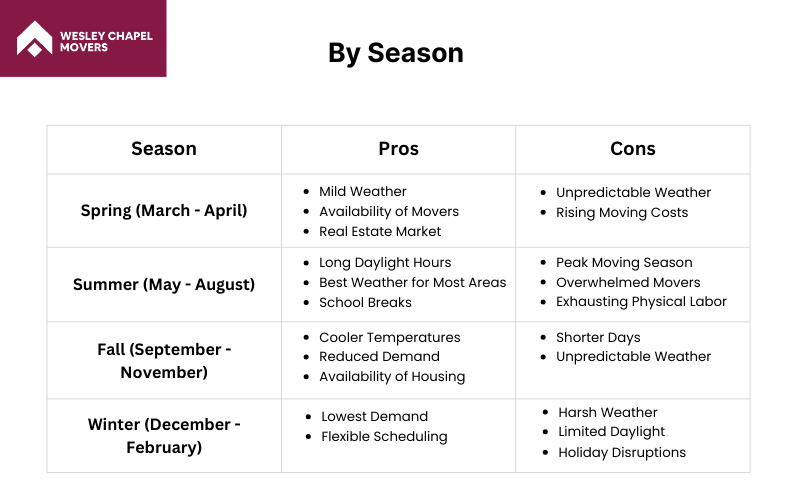
Weather, cost, availability of moving companies, and personal schedules all vary across the season in which you move, making it essential to choose the right time based on your priorities. For example, winter can be more cost-saving for you, while summer can be the most expensive. Here is a closer look at how each season affects your move.
Spring (March – April)
Spring is often considered the ideal time for moving due to mild weather and the availability of moving services. The moderate temperatures make it easier to handle the physical aspects of moving without the extreme heat or cold that can accompany other seasons. This reason specifically sees around a 15-20% increase in moving activity during spring compared to winter. Additionally, the real estate market tends to pick up in the spring, giving you more housing options to choose from. Working with a professional relocation company during this time can ensure that your move is smooth and efficient.
Pros:
- Mild Weather: Ideal conditions for moving, reducing the physical strain, and making the process more comfortable.
- Availability of Movers: Less competition for movers compared to summer, leading to better availability and more flexible schedules.
- Real Estate Market: Spring often aligns with the home-buying season, offering more housing options.
Cons:
- Unpredictable Weather: Rain, storms, or fluctuating temperatures can complicate the moving process.
- Rising Moving Costs: Prices may begin to increase as the peak summer season approaches.
Summer (May – August)
With over 40% of all U.S. moves taking place between May and August, summer is the peak moving season, with June being the busiest month. This is mainly because of school breaks, which allow families to move without interrupting their children’s education. The long daylight hours also provide plenty of time to pack, load, and unload, making the process feel less rushed. However, due to high demand, summer is also the most expensive time to move, with moving companies charging higher rates and having limited availability. Booking a professional mover well in advance is essential to secure your desired date and avoid price surges.
Pros:
- Long Daylight Hours: More time to pack, load, and unload, providing a less rushed moving experience.
- Best Weather for Most Areas: Ideal conditions for moving, especially for long-distance moves.
- School Breaks: Families with children can move without disrupting their school year, offering more time to settle in.
Cons:
- Peak Moving Season: High demand for moving services leads to higher prices.
- Overwhelmed Movers: Movers may struggle with demand, resulting in longer wait times or lower service quality.
- Exhausting Physical Labor: The high summer temperatures can make the move physically demanding, leading to potential fatigue or heat-related issues.
Fall (September – November)
Fall offers a sweet spot for those looking to balance affordability and comfort. The cooler temperatures make it easier to move without the harsh heat of summer, and the reduced demand for movers means lower costs. As falls account for roughly 20% of annual moves, you will likely find more availability from moving companies during this season, giving you more flexibility in scheduling your move. A professional relocation company can help ensure your move during fall is not only affordable but also efficient and stress-free.
Pros:
- Cooler Temperatures: Ideal conditions for moving, providing relief from the summer heat and reducing physical exhaustion.
- Reduced Demand: Fewer people move during the fall, meaning more availability of movers and potentially lower costs.
- Availability of Housing: More housing options with reduced competition compared to the summer months.
Cons:
- Shorter Days: Less daylight can limit the amount of time available to complete the move.
- Unpredictable Weather: Early snowstorms or heavy rain can cause delays or complications.
Winter (December – February)
Winter is the least popular time to move, with demand for moving services dropping by up to 40%. This drop in demand for service offers an opportunity for cost savings, as moving companies generally have lower rates during the winter. However, the harsh weather of winter can present serious challenges. Snow, ice, and extreme cold can complicate the moving process, making roads slippery and potentially delaying moving schedules. Therefore, while moving in this season has its own benefits, accounting for drawbacks is important.
Pros:
- Lowest Demand: This leads to the lowest prices for moving services, as fewer people are moving during this time.
- Flexible Scheduling: Movers are more likely to have open slots, providing flexibility for scheduling.
Cons:
- Harsh Weather: Snow, ice, and extreme cold can delay moving times and cause physical challenges (e.g., slippery roads, frozen equipment).
- Limited Daylight: Short days mean fewer hours to complete the move.
- Holiday Disruptions: The holiday season can make scheduling difficult, especially if you need to align your move with others or rely on friends or family for assistance.
By Week
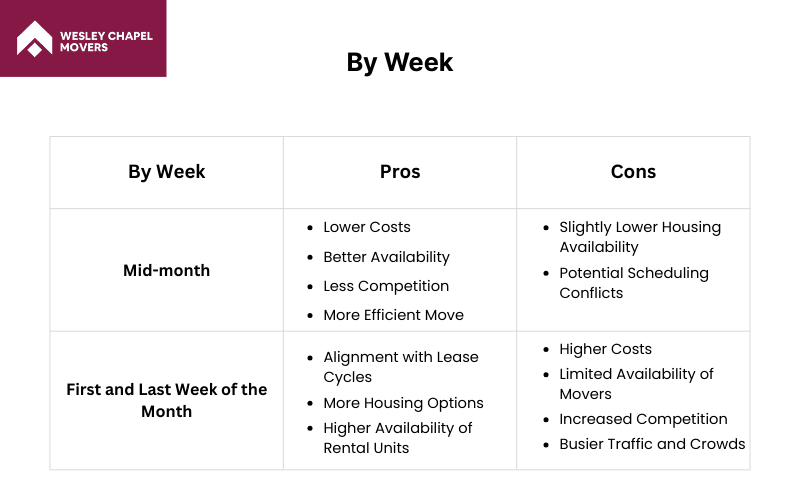
When deciding on the best time to move, the week of the month can play a significant role in both availability and cost. Moving mid-month can offer more flexibility and savings, while the first and last weeks of the month tend to see higher demand due to lease cycles and the end-of-month deadlines.
Mid-month
Moving mid-month is often the best option for those looking to save money and avoid the rush. With fewer people moving, there are typically lower costs and more availability of movers. However, housing availability might be slightly lower compared to the peak periods.
Pros:
- Lower Costs: Fewer people are moving mid-month, leading to lower demand, which results in lower moving costs.
- Better Availability: Moving companies are generally less busy, offering more flexible scheduling and quicker service.
- Less Competition: With fewer people moving, you will have more housing options to choose from and less competition in the market.
- More Efficient Move: Less congestion means faster, more efficient moving services and less wait time for movers.
Cons:
- Slightly Lower Housing Availability: Because fewer people are moving mid-month, rental listings may be less abundant than at the beginning or end of the month.
- Potential Scheduling Conflicts: If you have a fixed lease cycle, you may need to align the move to fit both ends of your lease, which could be trickier with a mid-month move.
First and Last Week of the Month
The first and last weeks of the month are the most popular times to move, thanks to lease cycles. These periods offer more housing options but come with higher costs, limited availability of moving services, and more competition in the market.
Pros:
- Alignment with Lease Cycles: The first and last weeks of the month are ideal for those whose leases start or end during these periods, making it easier to coordinate the move.
- More Housing Options: Many rental agreements change at the start or end of the month, so more homes may be available, giving you more choices in finding the perfect place.
- Higher Availability of Rental Units: Because of lease turnover, rental properties are likely to be more abundant during these weeks.
Cons:
- Higher Costs: Peak moving season means higher demand for moving services, which results in higher prices for movers and rental services.
- Limited Availability of Movers: With so many people moving during these weeks, it can be difficult to find movers on your preferred dates, often requiring early booking.
- Increased Competition: More people moving means more competition for available homes, which may drive up prices and make it harder to secure your ideal place.
- Busier Traffic and Crowds: More people are out moving, which could lead to delays and longer wait times on moving day due to increased traffic and general congestion.
By Day
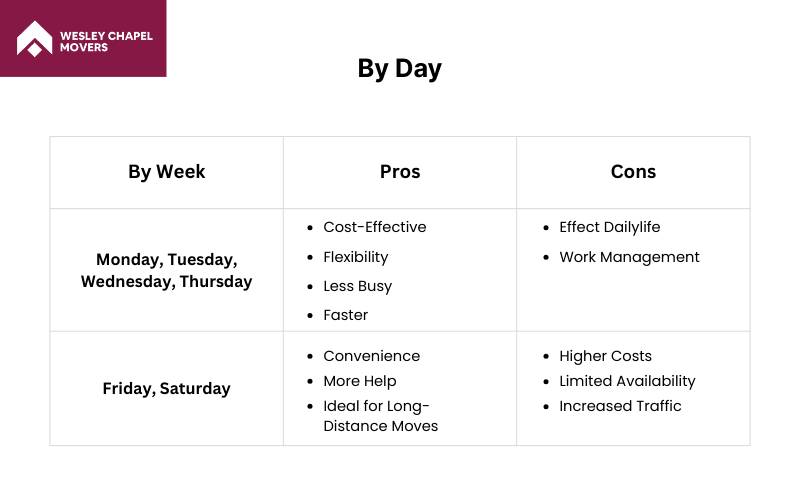
The day of the week you choose to move can have a significant impact on both cost and availability. Weekdays generally offer more flexibility and lower costs, while weekends, especially Friday and Saturday, are popular due to convenience but may come with higher prices and limited availability.
Monday, Tuesday, Wednesday, Thursday
Weekdays, particularly Monday through Thursday, are ideal for those looking for lower costs and greater availability of moving services. Movers are generally less busy, and there is less competition for these dates. However, some people may prefer weekends due to work or personal schedules, which could make weekdays less convenient for certain individuals.
Pros:
- Cost-Effective: During weekdays, costs are lower due to less demand for moving services.
- Flexibility: Offers you more flexible scheduling and better availability of movers.
- Less Busy: Compared to weekends, the traffic is less and fewer people are moving, making the process smoother.
- Faster: Moves within the weekdays are faster and more efficient service with fewer delays.
Cons:
- Effect Dailylife: May not be convenient for people with work or school schedules.
- Work Management: Requires taking time off work or making other arrangements during the week.
Friday, Saturday
Friday and Saturday are the most common days for moves, especially for people who have the weekend off. According to the survey from 2024, it has been indicated that Friday is the most busiest day for moving. These days provide the convenience of moving when most people are free, but they come with higher prices and limited availability due to increased demand.
Pros:
- Convenience: Convenient for people with weekend availability (e.g., families, people working traditional hours).
- More Help: More help is available from friends or family who have the weekend off.
- Ideal for Long-Distance Moves: Great for long-distance relocations when travel is required.
Cons:
- Higher Costs: It often results in higher prices due to peak demand for moving services.
- Limited Availability: Moving companies are more booked, requiring early booking.
- Increased Traffic: Heavy traffic and potential delays, especially on busy weekends.
By Time of Day
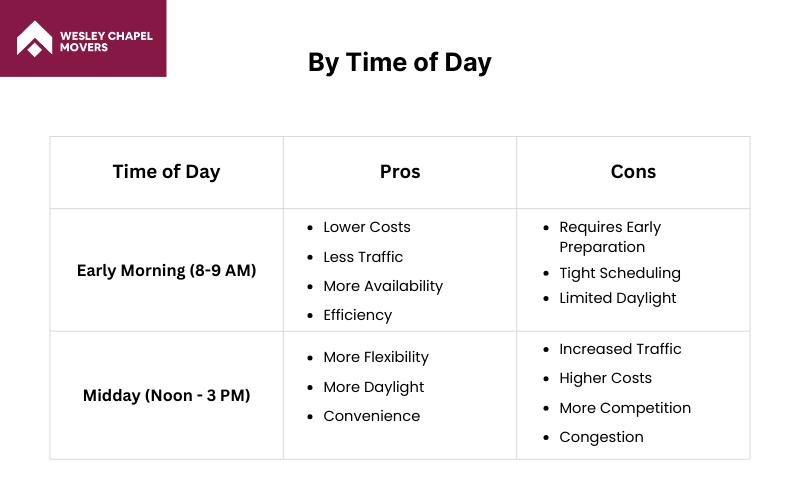
The time of day you choose to move can have a significant impact on both costs and the efficiency of your move. Moving in the early morning can offer cost savings and a quieter environment, but may require more planning. Midday moves, on the other hand, offer a bit more flexibility but come with potential delays due to heavier traffic and higher moving rates.
Early Morning (8-9 AM)
Early morning moves, typically starting between 8-9 AM, are ideal for those looking to save money and avoid traffic. Moving during these hours usually means lower costs and faster, more efficient service as fewer people are on the roads. However, early morning moves may require a bit more coordination, as it can be challenging for some people to get everything ready early in the day.
Pros:
- Lower Costs: Reduced demand for moving services, leading to lower prices.
- Less Traffic: Fewer cars on the road, which speeds up transportation and reduces delays.
- More Availability: Moving companies are typically more available during early hours.
- Efficiency: Quicker, more efficient moves with fewer delays and distractions.
Cons:
- Requires Early Preparation: May not be convenient for those who prefer a slower start to their day.
- Tight Scheduling: It can be challenging to have everything packed and ready by 8 AM.
- Limited Daylight: If it is a larger move, the limited daylight hours can make the process more difficult to complete in time.
Midday (Noon – 3 PM)
A midday move, typically between Noon and 3 PM, provides more time to get organized compared to early morning moves. However, this window can come with challenges, such as heavier traffic and potentially higher costs due to peak moving hours. While it is a more flexible time frame, it may not be as efficient as moving early in the morning. Therefore, hiring and consulting with a professional moving company can help you make this move easy and hassle-free.
Pros:
- More Flexibility: Offers more time to prepare and get everything packed and organized.
- More Daylight: Longer daylight hours provide more time to finish the move without rushing.
- Convenience: Ideal for those who do not want to start too early in the day.
Cons:
- Increased Traffic: Heavier traffic during midday can lead to delays, especially in urban areas.
- Higher Costs: Higher prices due to this being a more popular time for moving services.
- More Competition: More people are moving during these hours, which may require earlier booking for moving services.
- Congestion: Potential for more crowded streets or delays at the new location, especially in busy neighborhoods.






